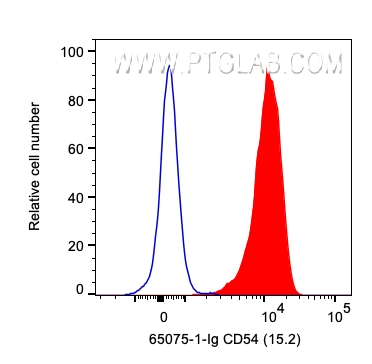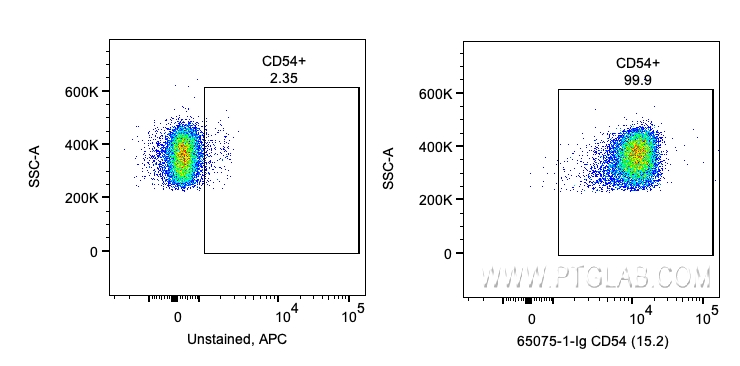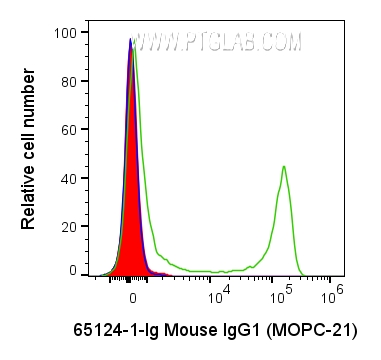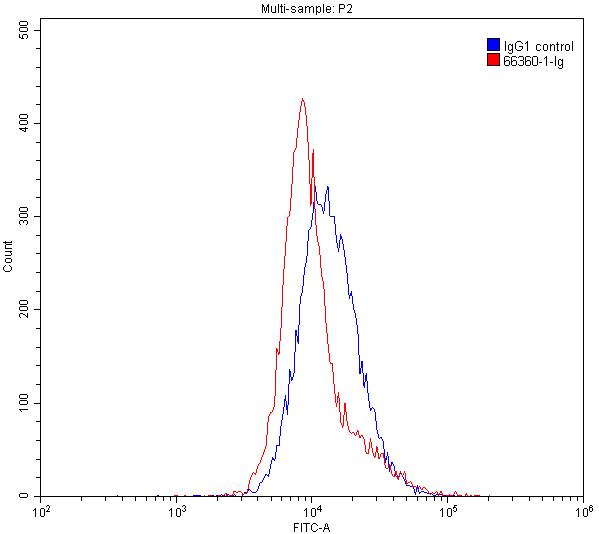Anti-Human CD54 (ICAM-1) (15.2)
CD54 (ICAM-1) Monoclonal Antibody for FC
Host / Isotype
Mouse / IgG1, kappa
Reactivity
Human
Applications
FC
Conjugate
Unconjugated
CloneNo.
15.2
验证数据展示
经过测试的应用
| Positive FC detected in | human PBMCs |
推荐稀释比
| Application | Dilution |
|---|---|
| This reagent has been tested for flow cytometric analysis. It is recommended that this reagent should be titrated in each testing system to obtain optimal results. | |
| Sample-dependent, Check data in validation data gallery. | |
产品信息
65075-1-Ig targets CD54 (ICAM-1) in FC applications and shows reactivity with Human samples.
| Tested Applications | FC |
| Tested Reactivity | Human |
| Immunogen | Rheumatoid synovial cells and human monocytes 种属同源性预测 |
| Host / Isotype | Mouse / IgG1, kappa |
| Class | Monoclonal |
| Type | Antibody |
| Full Name | intercellular adhesion molecule 1 |
| Synonyms | BB2, CD54, ICAM 1, ICAM1, ICAM-1, P3.58 |
| Calculated Molecular Weight | 90 kDa |
| GenBank Accession Number | BC015969 |
| Gene Symbol | ICAM1 |
| Gene ID (NCBI) | 3383 |
| ENSEMBL Gene ID | ENSG00000090339 |
| RRID | AB_2918379 |
| Conjugate | Unconjugated |
| Form | Liquid |
| Purification Method | Affinity purification |
| UNIPROT ID | P05362 |
| Storage Buffer | PBS with 0.09% sodium azide. |
| Storage Conditions | Store at 2-8°C. Stable for one year after shipment. |
背景介绍
ICAM-1 (CD54) is a 90-kDa transmembrane glycoprotein of the immunoglobulin superfamily and is critical for the firm attachment and transmigration of leukocytes out of blood vessels and into tissues (PMID: 19307690). ICAM-1 is expressed by several cell types, typically on endothelial cells and cells of the immune system, and its expression can be up-regulated by various stimuli, including TNF-α, INF-γ, IL-1 and thrombin (PMID: 3086451; 9694714; 15979056). It is a ligand for LFA-1 and Mac-1, serves as a receptor for rhinovirus, and is one of several receptors used by Plasmodium falciparum (PMID: 2566624; 2538244; 2475784).
实验方案
| Product Specific Protocols | |
|---|---|
| FC protocol for CD54 (ICAM-1) antibody 65075-1-Ig | Download protocol |
| Standard Protocols | |
|---|---|
| Click here to view our Standard Protocols |



